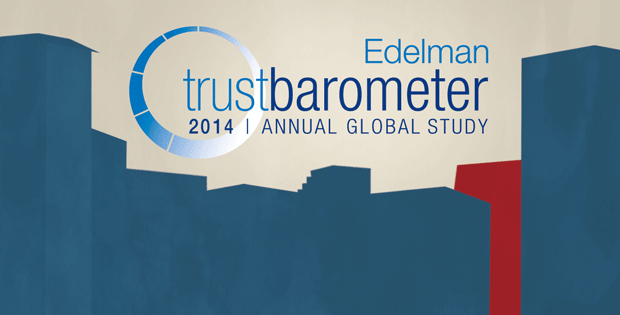
We all know how important trust is for any aspect of life: personal, work and education. Edelman, the global public relations firm, has been surveying the trust levels of the public for the last 14 years through the Edelman Trust Barometer. Their annual survey was released earlier this week – 33,000 people in 27 global markets took part. There are a number of takeaways from this survey for individuals working within higher education.
Academics
For many years, I have communicated to academics that they can serve as a valuable resource to the media because they generally can act as non-biased experts who provide analysis on topics. The Trust Barometer supports this notion – in 2014, 67% responded that they see academics as credible spokespersons, a particularly high mark in comparison to other groups. It is important for academics to be cognizant of this, and not to damage this reputation.
The New York Times reported in a story last month that a University of Houston professor frequently defended financial speculators in various public remarks, including Congressional testimony. According to the Times, the professor neglected to mention that he had personally benefited from these financial speculators. Such stories are obviously detrimental to the role of an academic in serving as a credible source.
The takeaway is twofold for professors: realize your value as a commentator, but if there is a conflict of interest, either disclose it at the outset or stay on the sidelines.
Public Relations Professionals
If you are a spokesperson for an organization (not necessarily with an academic institution), then don’t consider yourself a trusted source. Only 13% of respondents trust a media spokesperson when communicating about products and services related to the organization. In fact, a media spokesperson ranks significantly lower in this category compared to the CEO of an organization, activist consumers, academics and employees (see page 36 in the presentation of results).
Any PR professional with even an iota of self-awareness should recognize this perception problem. Kate Samuels, Global Crisis Communications Manager for Hess, eloquently highlights this problem in a blog post published on January 21. She writes: “Yes, a communicator’s job is to protect their company’s reputation. But that means engagement, based on facts, not half-truths or spin. It involves talking to people, and listening to them, not just publishing the information we choose. I have never met a communications person who lies for a living, and I doubt I ever will.” I agree wholeheartedly with Kate’s assessment.
Restoring trust is indeed difficult. First and foremost, we as public relations professionals need to realize at the outset that the receiving party probably doesn’t trust us. We need be even more vigilant in demonstrating integrity and honesty when communicating to different stakeholders. Doing so shines a better light both on our profession and the organizations we represent.
Deans and Presidents
Edelman surveyed the public’s trust of CEOs. The good news – trust in CEOs has increased 12 percentage points over the past five years. The bad news – more than half of respondents still don’t trust them (just 43% do). The survey did not break down this CEO category to specifically include academic institutions. That said, presidents and deans of universities and schools exert a significant amount of influence and power and surely these findings apply in some way to top leaders of academic institutions.
If you intuitively feel that trust in you as a leader could be higher and you want to restore it, then the Trust Barometer offers some useful actions to take based on survey respondents:
- Communicate clearly and transparently (82%)
- Tell the truth regardless of how unpopular or complex the situation is (81%)
- Engage with employees regularly (80%)
- Be front and center during challenging times (79%)
- Support local charities and good causes (69%)
- Have an active media presence (53%)
If you feel trust is high, then reinforcing these actions could only be a positive. Communications advisers to the CEO / President / Dean of an institution should also note these findings and use it as a call to action.
Intuition is a starting point. However, a deliberate, measurable and systematic approach to this trust challenge would obviously provide even further clarity on issues and actions to take. HR departments and/or outside parties can serve as useful reference points to guide a non-biased perspective.
Trust and results go hand-in-hand. Accessing the levels and making changes accordingly can only lead to better results.
To access the full summary of the Trust Barometer, access the following link.
